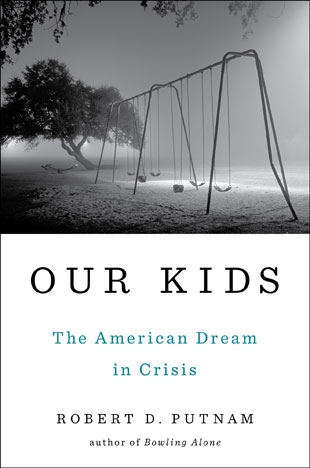"Contemporary discussion of inequality in America often conflates two related but distinct issues:
"• Equality of income and wealth. The distribution of income and wealth among adults in today's America — framed by the Occupy movement as the 1 percent versus the 99 percent — has generated much partisan debate during the past several years. Historically, however, most Americans have not been greatly worried about that sort of inequality: we tend not to begrudge others their success or care how high the socioeconomic ladder is, assuming that everyone has an equal chance to climb it, given equal merit and energy.
"• Equality of opportunity and social mobility. The prospects for the next generation — that is, whether young people from different backgrounds are, in fact, getting onto the ladder at about the same place and, given equal merit and energy, are equally likely to scale it — pose an altogether more momentous problem in our national culture. Beginning with the 'all men are created equal' premise of our national independence, Americans of all parties have historically been very concerned about this issue. …
"Americans are today divided about how much (if at all) income and wealth should be redistributed, Robin Hood-like, from today's affluent to today's poor. More than two thirds of us (concentrated among Democrats, minorities, and the poor, but including majorities of people of all political persuasions and walks of life) favor a more equal distribution than obtains today. While large majorities favor pragmatic steps to limit inequality of condition, we are also philosophical conservatives, suspicious of the ability of government to redress inequality and convinced that responsibility for an individual's well-being rests chiefly with him or her.
"On the other hand, we are less divided about the desirability of upward mobility without regard to family origins. About 95 percent of us endorse the principle that 'everyone in America should have equal opportunity to get ahead,' a broad consensus that has hardly wavered since opinion surveys began more than a half century ago. (The consensus is a bit shakier when the question is whether our society should do 'whatever is necessary to make sure that everyone has an equal opportunity to succeed.' Nine in ten Americans agree, but only 48 percent of the top quintile in terms of socioeconomic status agree strongly, as compared to 70 percent of the bottom quintile.) About 90 percent of Americans of all political persuasions say they support more spending on public education to try to ensure that everyone gets a fair start in life. And if forced to choose, Americans at all income levels say by nearly three to one that it is 'more important for this country ... to ensure everyone has a fair chance of improving their economic standing [than] to reduce inequality in America.' As the former Federal Reserve chair Ben Bernanke has phrased it, 'A bedrock American principle is the idea that all individuals should have the opportunity to succeed on the basis of their own effort, skill, and ingenuity.' "
